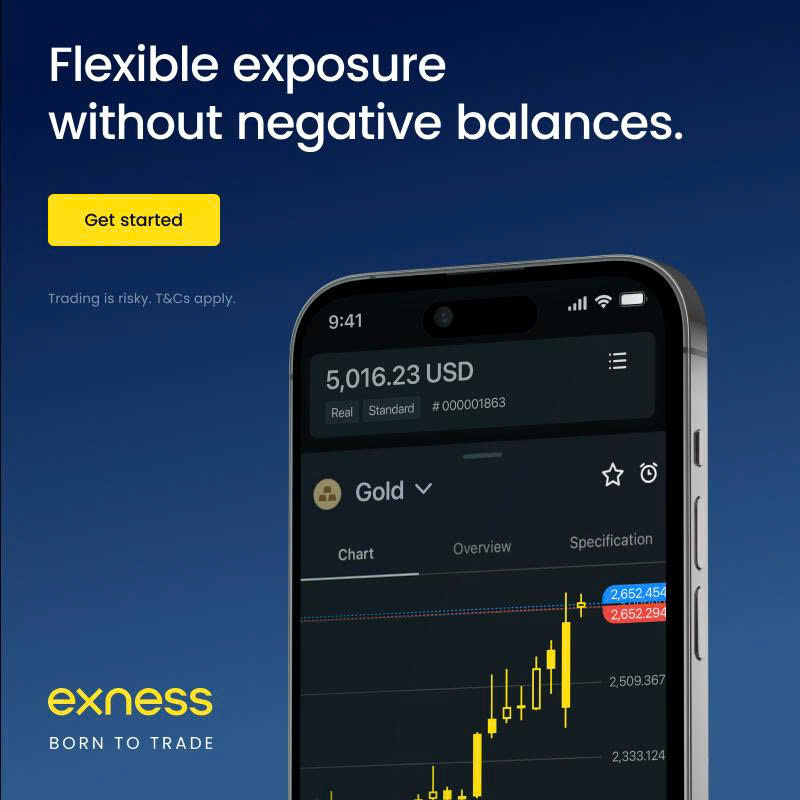
6 minute read
How to Start Forex Trading in Dubai: A Comprehensive Guide
from Exness
by Exness Blog
Forex trading in Dubai has gained massive popularity in recent years. If you’re in Dubai and wondering how to start forex trading legally, safely, and profitably, this guide will walk you through everything you need—step-by-step.
Top 4 Best Forex Brokers in Dubai
1️⃣ Exness: Open An Account or Visit Brokers 🏆
2️⃣ XM: Open An Account or Visit Brokers 💥
3️⃣ JustMarkets: Open An Account or Visit Brokers ✅
4️⃣ Quotex: Open An Account or Visit Brokers 🌐
How to Start Forex Trading in Dubai?
To start forex trading in Dubai, you need to choose a regulated broker, open a trading account, deposit funds, and begin trading using a reliable trading platform. Make sure you comply with local laws and understand the risks involved in forex trading.
Step 1: Understand the Legal Framework in Dubai
Forex trading is legal in Dubai as long as you trade through a broker regulated by one of the recognized financial authorities. The UAE has strong financial regulatory bodies such as:
Dubai Financial Services Authority (DFSA) – Regulates firms operating within the Dubai International Financial Centre (DIFC).
Securities and Commodities Authority (SCA) – Regulates financial firms operating across the UAE (outside DIFC).
Never trade with an unregulated broker. Always check that your broker is licensed either by the DFSA, SCA, or a Tier-1 global regulator like the FCA (UK), ASIC (Australia), or CySEC (Cyprus).
Step 2: Choose a Reliable Forex Broker
Picking the right broker is the most critical decision when starting forex trading in Dubai. Look for the following features:
Regulation: DFSA/SCA or international Tier-1 licenses.
Low spreads and commissions: The cost of trading should be reasonable.
User-friendly platforms: Prefer brokers offering MetaTrader 4 (MT4), MetaTrader 5 (MT5), or their own intuitive platforms.
Local deposit and withdrawal options: The ability to use AED and UAE-based payment methods is a plus.
Arabic/English support: This is essential if you prefer local customer service.
Popular brokers that support clients from Dubai include Exness, XM, IC Markets, Pepperstone, and AvaTrade. But always do your own due diligence.
Step 3: Open a Trading Account
Once you’ve selected a broker, go to their website and register for a trading account. You’ll typically be asked to provide:
Full name and contact information
Proof of ID (Emirates ID or Passport)
Proof of residence (DEWA bill or bank statement)
The account verification process usually takes a few hours to one business day. Once verified, you can access your trading dashboard.
Step 4: Fund Your Account
To start trading, you need to deposit money into your broker account. Most brokers accept:
Bank transfers
Credit/Debit cards
E-wallets (Skrill, Neteller)
Crypto deposits (in some cases)
Ensure you deposit a comfortable amount that you can afford to lose. For beginners, $100 to $500 is often a good start. Some brokers offer demo accounts if you want to practice first.

✅ Trade with Exness now: Open An Account or Visit Brokers 👈
Step 5: Choose Your Trading Platform
Once your account is funded, you’ll be able to use a trading platform. The most popular platforms include:
MetaTrader 4 (MT4) – Ideal for beginners, easy-to-use, and very popular in Dubai.
MetaTrader 5 (MT5) – Offers more advanced features like multi-asset trading.
Web platforms or mobile apps – Convenient for users who prefer not to install software.
Make sure to familiarize yourself with charts, indicators, and basic order types such as market orders, limit orders, and stop-losses.
Step 6: Learn Forex Trading Basics
Before risking real money, it’s crucial to understand how forex trading works. Key concepts you must master include:
Currency pairs: Major (EUR/USD), Minor (GBP/JPY), Exotic (USD/TRY)
Pips and lots: Measures of price change and trade size
Leverage: Allows you to control larger positions with a smaller amount of money (can increase both profits and losses)
Risk management: Never risk more than 1-2% of your capital on a single trade
Technical and fundamental analysis: Tools to predict price movement
Many brokers offer free webinars, courses, or demo accounts to help you build knowledge. Take full advantage of these.
Step 7: Start Trading with a Strategy
Don’t trade blindly. Successful forex trading requires a clear strategy. Popular strategies for beginners include:
Trend trading: Buying when price is going up, selling when it’s going down
Breakout trading: Entering trades when price breaks key levels
Scalping: Making quick trades on small price movements
Swing trading: Holding trades for several days to capture medium-term trends
Always backtest your strategy and use a demo account to practice before using real money.
Step 8: Track Your Performance and Improve
Keep a trading journal to record:
Your trades (entry/exit)
The strategy used
Mistakes and lessons learned
Profits and losses
Over time, this will help you identify what works and what doesn’t. Consistent improvement is key to long-term success in forex trading.
Is Forex Trading Profitable in Dubai?
Yes, forex trading can be profitable in Dubai, but it is also high-risk. Most beginners lose money due to poor risk management or lack of knowledge. However, if you take time to learn, use a disciplined approach, and choose the right broker, it is possible to make steady profits.
Can Foreigners Trade Forex in Dubai?
Absolutely. Dubai is one of the most investor-friendly cities in the world. Both UAE nationals and expatriates can legally trade forex, as long as they use a licensed broker and comply with local regulations.
Are Forex Earnings Taxable in Dubai?
Dubai has no personal income tax, including on forex profits. This makes it an attractive destination for both retail and institutional forex traders. However, if you operate as a company or under a free zone license, consult a tax advisor for updated corporate tax rules.
Is Forex Trading Halal in Dubai?
The question of whether forex trading is halal or haram depends on how it is conducted. Many brokers offer Islamic accounts that comply with Shariah law, by removing interest (swap) fees. If you are concerned about this aspect, always request a swap-free account from your broker.
Final Tips for New Forex Traders in Dubai
Start small – Don’t invest more than you can afford to lose.
Educate yourself – The more you know, the better your chances of success.
Choose the right broker – Regulation and local support matter.
Avoid scams – Never trust anyone promising guaranteed profits.
Be patient – Profitable trading takes time and discipline.
Conclusion
Starting forex trading in Dubai is simple if you follow the correct process. Choose a regulated broker, open a verified account, fund it responsibly, and learn the basics before placing real trades. Dubai’s investor-friendly laws, tax advantages, and access to global markets make it one of the best places in the world to start your forex journey.
Forex trading isn’t a get-rich-quick scheme, but with education, practice, and discipline, it can become a profitable side income or even a full-time career. Take the first step wisely, and your trading future in Dubai can be bright.
✅ Trade with Exness now: Open An Account or Visit Brokers 👈
Read more:










